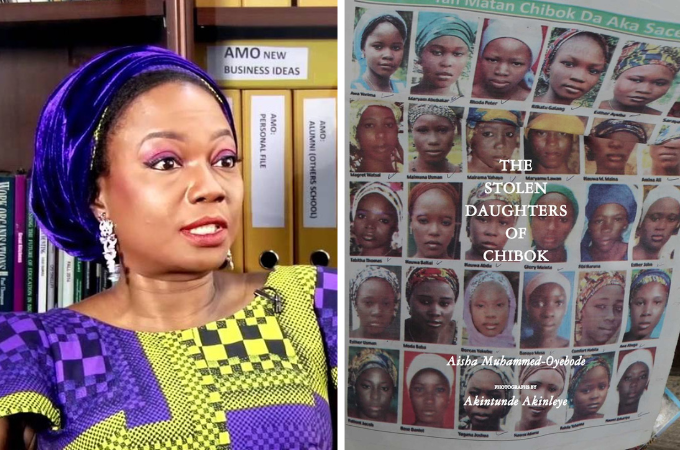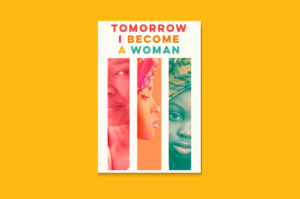
Nine years ago, the terrorist group Boko Haram abducted 276 schoolgirls in the town of Chibok, Northeast Nigeria in April 2014. This book is their story. Written with care and thought by Aisha Muhammed-Oyebode, The Stolen Daughters of Chibok is a nonfiction collection of essays, interviews, and photographs to pay tribute to the lives of the girls.
Published by powerHouse Books on April 4, The Stolen Daughters of Chibok was released nine years after the abduction took place. While many of the girls managed to escape, 112 girls still remain captive. Muhammed-Oyebode’s sensitive writing and Akintunde Akinleye’s photographs capture the traumas that these girls have gone through along with their families before and after the abduction.
I am sure most of you have heard about and continued to follow this tragic story of the Boko Haram abduction. But here is a quick recap about what happened to the girls after the abduction in April 2014:
- In the days following the abduction, 57 of the 276 girls managed to escape.
- For two years from 2014–2016, 219 girls remained missing.
- In May 2016, the first of the missing students, Aisha Nkeki Ali, was found by the Nigerian military.
- In the years after, 107 more have made it home: 4 by Nigerian military/ para-military intervention, 21 by negotiated release in October 2016, and 82 more in May 2017. Both deals were brokered by Switzerland and the International Committee of the Red Cross.
- Complex negotiations continue till this day between the Nigerian Government and Boko Haram for the 112 girls who remain captive.
Aisha Muhammed-Oyebode is a Nigerian author, lawyer, development specialist, international non-governmental organization (NGO) expert, and human rights activist specializing in women and girls’ initiatives. She has an LLM in Public International Law from King’s College London, an MBA in Finance from Imperial College London, and a doctorate degree from the School of Oriental and African Studies (SOAS) University of London.
Why is Muhammed-Oyebode’s POV so important to this book?
She is the founder and CEO of the Murtala Muhammed Foundation, a political advocacy NGO dedicated to creating socioeconomic change on the African continent, across the fields of education, capacity building, and disaster risk management, particularly regarding the insurgency and terrorism in Northeast Nigeria. In addition, she convened the Bring Back Our Girls Movement in the aftermath of the abduction in Chibok.
During the last four months of 2015 when the insurgency was at its worst, Muhammed-Oyebode through the MMF embarked on a project to interview, photograph, and document the accounts of the parents of each of the missing girls. The MMF’s team managed to meet the relatives of 201 of the girls and recorded their experiences.
The trauma of the abduction continues to be a reality for the families and the Chibok community. This collection compiles supplemental essays by experts, interviews, and photographs of 152 of the 210 Chibok families. As a tribute to the girls, the book beautifully captures their lives before the abduction and highlights how their families have struggled to cope afterward.
Chibok organizations are working to educate people and help them embrace the returned girls, many of whom underwent sexual exploitation and some of them pregnant or with children they bore in captivity. In an interview, Muhammed-Oyebode says there is a stigma associated with the sexual exploitation the girls endured.
She adds, “I think it’s going to take a lot of education for people to begin to realize that these things have happened through no fault of these girls. And we actually have a greater responsibility because they were taken under our watch.”
This book serves as a resource to everyone in Chibok, Nigeria, and the world to help people understand the plight that these young girls went through and have empathy for them, instead of stigmatizing their experiences. Even more so, because there is no clear path to rehabilitate these girls from their trauma, as the author remarks in an interview:
More questions than answers have emerged from our collective attempts to reckon with the facts and severity of the Chibok disaster. As we approach the 9th anniversary of the Chibok kidnapping, what remains clear is that there is still no route that brings women and girls from conflict to safety. Women and girls in Nigeria and globally deserve security, education, and a better future – I will make it my mission to work with partners to establish this as an urgent priority.
Our hearts go out to the girls abducted by the Boko Haram, those returned and ones still missing. If you are into nonfiction essays about African history and major political events with a focus on women’s experiences, then The Stolen Daughters of Chibok is definitely a must read!
***
Buy The Stolen Daughters of Chibok: Amazon (US) | powerHouse Books | Bookshop (UK)








COMMENTS -
Reader Interactions